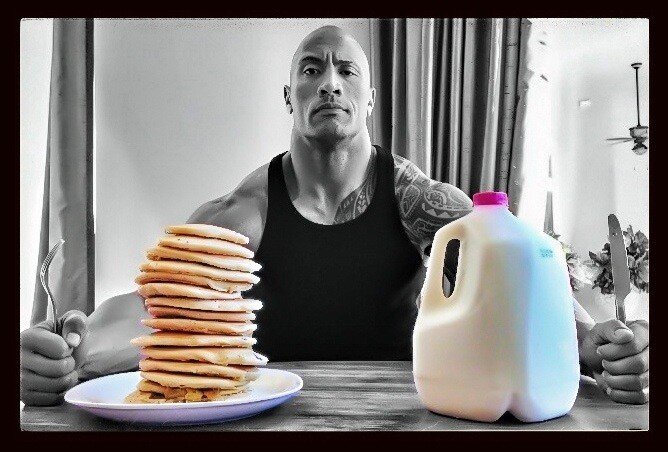A die-hard intermittent fasting fan recently asked for my opinion of his chosen fat loss diet.
Now he knows I ain’t no damn faster. But rather than beat him over the head with the usual talking points, I offered the following:
“You’re getting the results you seek and you say your health is great. You’re even enjoying the diet and have no trouble sustaining it. Why even ask me? It obviously works.”
A cop out answer? Perhaps. Maybe even a little dishonest. Or at the very least, lacking in context.
But I stand by this:
If something works (gets results), and works for you (you can sustain it), and most of all you believe in it, then praise Odin, it works.
However:
- It doesn’t mean it’s the absolute best approach for everyone.
- It doesn’t even mean it’s the “best”approach (as in most effective) for you.
- It doesn’t mean it will always be the “best” approach should your goals change. (I’m talking to you, Mr. Fasting and Trying to Get Big).
- And it certainly doesn’t mean it “works” for the reasons you think. (Now I’m talking to Mr. Fasting is Raising My Growth Hormone).
The last point in particular is where a lot of these “faith based” arguments in support of dietary/training practices really fold under scrutiny.
Still, let’s be pragmatic for a moment: this is a results-driven game. And good results require consistency and sustainability and “buy in” more than anything else.
For these reasons I sometimes miss “the good old days.” When physique athletes blindly followed a list of bizarre rules set forth by the more tenured bros before them, much of which had the all the scientific backing of “Cause I Said So Buddy.”
But still, a lot of those rules kinda worked. Just not for the reasons we thought. Here’s just two.
Myth #1. Don’t eat after 8pm.
Meathead Reason it Worked: “After the sun goes down, your body’s digestive system punches a clock and heads for Miller time. As such, anything you eat or drink just sits in your stomach and turns into fat. I mean, you saw Gremlins right?”
Real Reason it Worked: Shortening the available time one is “allowed” to eat means less opportunity to consume calories. Especially late night snacking.
Reason it Should Make a Comeback: A food choice made in a housecoat is rarely a good food choice.
In case you haven’t heard, your metabolism isn’t affected significantly by the time of day calories are consumed. So if your daily maintenance calories is 2200 and you eat around 1700, except all in one large meal at 10 PM while binge watching re-runs of Barney Miller, you will lose weight — if you do this consistently.
This has been liberating for many whose jobs or lifestyles steer them towards eating most of their calories in the evening; usually folks who don’t wear golf shirts with ‘Personal Trainer’ embroidered on the back.
So why would anyone want to see a resurgence of the silly “no eating after 8 PM” rule?
I call it the Housecoat Rule: that food choices people make when they want to relax before bed are rarely good choices.
We eat to fuel our bodies (and sustain life and build muscle, blah, blah). But we also eat to relieve stress and chill out after a stressful day. And to forget that we just can’t meet that right someone, no matter how much swiping-left we do.
So to many, food is medicating. And being in a calorie deficit only cranks up the anxiety.
Problem is, stressed/tired/overwhelmed/sad people don’t typically seek “clean” foods. (Ever hear ‘OMG, I was so stressed last night I totally finished off an entire bag of broccoli’?)
Instead they reach for comfort or easy convenience foods. And rarely in amounts in line with the “suggested serving size” on the package, which in the case of most snack foods should require that “suggested” be written in italics and with a winky-face.
Obviously using weekly food preparation strategies or having ready-to-eat meals on hand is the best solution. Or even following a fasting or calorie “backloaded” approach.
Still, I’ve heard people sa,y “I was fully prepared and had {insert healthy meal} when I got home, but still ate a jar of natural peanut butter before bed. But that’s good fat, right?”
Yeah. No.
So try no food after 8 PM. Or 9. Or whenever your food diary (you do keep an honest one, right?) reveals you tend to fuck up.
It’s not right. Not even a little bit. It just works.

Myth #2. Carbs make you fat. So cut carbs (especially junk carbs) and you’ll get lean.
Meathead Reason it Worked: Where do I start? Cause spiking insulin, ketones, carb intolerance, fat adaptation, lean & jacked Inuit dudes eating whale blubber, poor insulin sensitivity, gluten intolerance, cause carbs is insulin and low insulin means fat burning all day erry day, sugar is toxic, and that damn bromide in my morning oatmeal.
Real Reason it Worked: Eliminating the easiest to eat (and overeat) macro leaves a whole lot of calorie ground left to be made up by protein and fat. A higher protein intake is also important for retaining muscle on a diet and is very satiating.
Reason it Should Make a Comeback: When was the last time you accidentally ate an extra steak while watching Making a Murderer?
Any sensible diet should include at least some carbohydrates. And if you exercise intensely and are in good shape, likely a lot more than you think.
For athletes carbs are the preferred energy source for intense exercise, and even for bodybuilders/look good naked types, carbs improve training and are protein sparing, so they help stave off protein from being used for fuel, especially when dieting.
And for every bro who says “But dudes got lean in the 60’s on zero carbs and high fat!” I will point out that just as many guys got even leaner in the 80’s on high carbs and next to no fat. Sorry for your fat adaptation woes, Mr. Keto. Care for a breath mint?
In the end, it’s the calories driving the Weight-Loss-Weight Gain bus more than anything. And a moderate (not low, not sky high) approach to all three macros is the best route, at least most of the time.
But here’s the thing: Carbohydrates, much like that special someone you text “what r u wearing?” at 2 AM, can be a little too free & easy.
Don’t believe me? Next time you’re on a road trip, try meeting your macros at a gas station.
Protein, you’ll be limited to sketchy ready-to-drink protein shakes or beef jerky that was vacuum-sealed back when President Carter carried his own golf clubs. But carbs? Oh the sweet options. Where do you start?
Or better yet, where do you stop? Many carbs, especially the snack options like Oreos, are engineered to be hyperpalatable. So they offer wonderful “mouth feel” but deceptively little satiety.
Even “healthier” options like pasta are surprisingly high in calories per typical serving. Ever measure out what a suggested serving of pasta looks like?
And that’s all simple enough to work around — if you’re on point with your food tracking.
Because show me someone in good shape who eats lots of breakfast cereal, pasta, and Nutri-Grain bars and I’ll show you either 10-plus hours a week of intense exercise, a 19-year old, or someone very disciplined with their food tracking.
So if you’re over 30 and wanna lose weight and train every other day, but find food weighing & logging a chore, it’s just easier to limit your carb choices to reasonable portions of more filling, less refined sources. Even (don’t make a run for it, I chained the exits) the lowly potato.
Because the expression is “try eating just one potato chip” not “try eating just one potato.”
To sum up, no carbs don’t make you fat. The fact you can’t stop eating them does. Cutting out the “junk” carbs, for many, just makes the process easier.
I fully admit that many of the rules we used to follow back in the day were bullshit. And to be perfectly honest, we knew most were bullshit even while we did them.
It was more like a rite of passage; repeating the suffering of those who went before us to hopefully earn our seat at the Big Meathead’s table.
But in the end, if some rules actually seemed to make the process a bit easier, and we lost fat, were they really wrong?
Food for thought, if nothing else.

